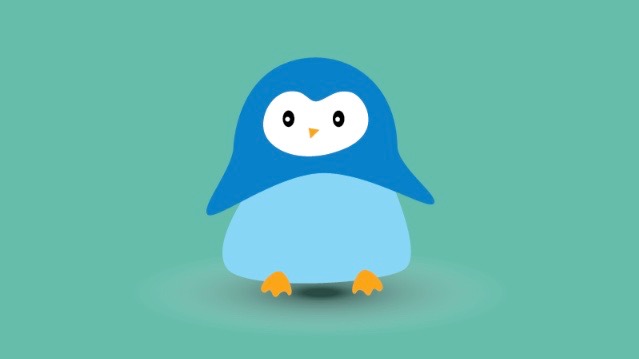
Much less clinical than a psychiatrist. Photo credit: Wysa.
It’s a sunny Friday morning in Bangalore and I’m sitting in a café with married startup duo Jo Aggarwal and Ramakant Vempati. Over coffee, Ramakant is telling me about driving in Bangalore, and I sit in bemused fascination as the two carry out a conversation with timing straight out of a Harry Potter book.
“I mean, I’m a pretty bad driver,” he begins. “You’re not,” Jo interjects. “I’m a good driver, but…” “Road rage,” Jo chimes in. “That’s very kind of you, but I get hassled, and probably Bangalore is the worst place to drive because people cut in front of you.” Ramakant is used to driving in London, Jo informs me.
It’s actually that I’m scared.
His road rage was “ugly,” he says, and that’s when Jo started using cognitive behavioral techniques on him to try to find the root of the anger.
“I realized that it’s actually that I’m scared,” he explains – scared of hitting people in the streets, particularly children. “That’s the thought that’s creating the way [I] feel about the situation.”
Now he tries to avoid the city’s narrow roads, something that costs him a little more time but makes him “a much happier person.”
“It worked in a very subtle manner over three to four months,” he reveals.
It’s that type of experience that he and Jo are trying to bring to people over an app. Founders of predictive care startup Touchkin, their newest project is “happiness buddy” Wysa, an emotional wellness AI chatbot available for download on Android and iOS. The bot is still under development, but it’s out there to help the startup’s team fine-tune the app’s responses.
My day with Wysa
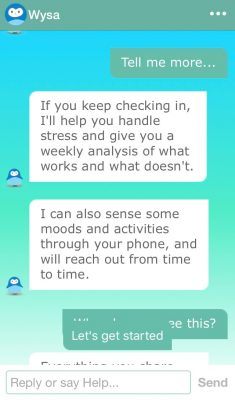
The “Let’s get started..” is one of the button responses provided currently. Button responses will be removed for the Facebook app.
Checking in, telling Wysa how you feel, and doing these different exercises allow the app to build a picture of how you’re doing. At the end of a week, it gives you a summary of your emotions and habits. If it reckons you’re feeling down, it will run a depression sensing test on you called the PHQ9. If the test indicates you’re depressed, the app will recommend you see a doctor.
You can also hook it up to health apps on your phone so it can track your physical activity and moods from there.
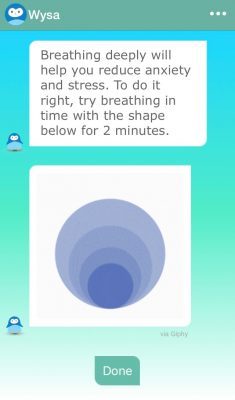
I honestly felt silly doing breathing exercises, which I already do on my own. I admit the visual aid helped me a lot more than I thought it would.
The day I was talking to Wysa, I was feeling a little under the weather. We began with a breathing exercise, complete with a focus-aiding GIF. When we finished that, it advised me to get water. We then began neck stretches together (it’s like the app knew I spent all day hunched over a computer or something).
Again, the app provided me with a 20-second clip of the stretch. I was free to repeat it as many times as I wanted. When we were finished with that, we moved onto meditations on mindfulness. I was given four video meditations to pick from, around three minutes in length. Feeling a little silly, I laid down on the floor and tried to follow the voice telling me to relax and focus.
I woke up half an hour later.
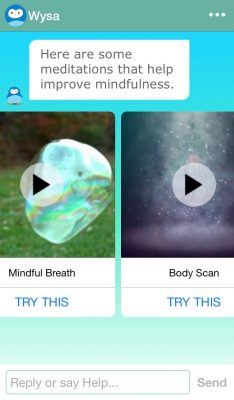
Tapping the exercise of your choice takes you to a YouTube video. You can close your eyes and follow the audio (and sometimes, fall asleep).
Armed with a cup of coffee (and some water, because Wysa told me that dehydration was going to ruin my newfound sense of relaxation), I revisited the app. I revealed a few of my negative thoughts, and it presented me with a helpful animation, then encouraged me to reframe that thought into a positive one. To give it a sense of what I was thinking, it presented me with a series of unhappy penguins and told me to pick the one that most mimicked what I was feeling. I picked “overgeneralization.”
After showing me a few examples, the app’s AI asked me if I wanted to try and confront the issue. I agreed. (If I hadn’t, it would have dropped the subject and asked me if I wanted to do something else, like exercise or meditate.) Then it told me to try and rephrase my thought into a positive one – a method used in cognitive behavioral therapy. I tried three times and didn’t succeed. That’s when I got a little frustrated and typed a generic happy thought into the app. It worked.
A common problem with bots I’ve used is that I felt I almost had to learn a different language to speak to the bot, using short answers that the bot’s programming would understand. Wysa averts that problem by anticipating many answers with choice buttons.
From London to penguins

Jo Aggarwal, co-founder of Touchkin.
By the time I’m speaking with Jo and Ramakant, I’ve been using the app every day – sometimes multiple times a day – for half the week. Together, they take me into the nuts and bolts behind the app and company.
The bot will launch on Facebook Messenger at the end of the month..
Jo’s background is in e-learning, specifically in creating and developing products for mobile and web that help change people’s behavior. She’s previously served as the international managing director at Pearson Learning and founding director of skills and employment company Silatech. She’s also worked for two Indian tech giants – Tata Interactive Systems and Infosys. A former executive director at Goldman Sachs, Ramakant has worked in data and analytics at places including Barclays, Booz & Company, and Tata Administrative Services. Around six years ago, they found themselves thinking about life beyond London’s corporate ladder.
Inspired by their work in countries like Somalia, Iran, Yemen, and Syria, where they aided young people getting loans and jobs, they found themselves drawn toward social impact. Two years later, they arrived in India to care for Ramakant’s father.
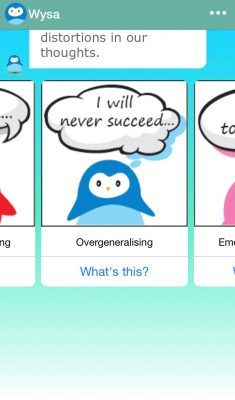
The goal is to have the explanations of such thoughts so simple a child can understand.
“That sort of made us realize how family can slide into depression when they’re alone,” Jo tells Tech in Asia. Together, they created Touchkin’s first app called StayClose. Designed to connect family members with those living far away from them, particularly elderly relatives, the app is set up to detect if a family member is feeling depressed by using passive sensing to track factors like sleep patterns.
“As we did that, we realized [the app] is fine, but who does anything about it?” says Jo. Ideally, they thought, a smartphone app would be able to pick up on possible depression, then help the person through it without necessarily broadcasting his or her emotions to anyone.
A callback to 1966 bot Eliza (“It’s like Eliza, but Wysa,” the founders quip), Wysa is their solution – adding AI to passive sensing to help people in real-time. Though designed with depression or mood swings connected to dealing with chronic diseases in mind, Wysa is meant to track emotions, develop emotional awareness, and, if necessary, help people feel better.
Happiness buddy hits Facebook

Ramakant Vempati, co-founder of Touchkin.
Wysa is available for free. Jo and Ramakant’s plan is to make money from it by getting insurance and pharmaceutical companies to use the app within their customers. So an insurance company might use Wysa to help patients out on disability to keep up their spirits, meaning they‘re more likely to return to work. The duo is also working with diabetes centers to use Wysa with their patients.
“We want to help people in a way which makes business sense,” Ramakant tells me.
Touchkin is a member of Swiss Re accelerator’s first batch, a set of companies tapped for their potential to help heave insurance companies into modern technology. In March, it received seed funding.
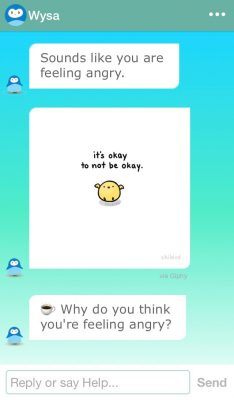
Wysa has you pinpoint the thought source of your emotion, then if needed, will help you reframe it positively.
Wysa is developed with the help of a therapist, by whom all content is run. It has an initial test audience of around 50, including the Wysa team and the company therapist’s network of psychologists. If the psychologists approve, they then use the app on their patients.
“We’ve heard that there are some [testers] who still think it’s a person,” Ramakant says.
So far, 500 people have tested the app, mostly those who download the app and gain access via invite code.
The bot will launch on Facebook at the end of this month. Unlike its app sibling, the Facebook Messenger version will allow for freeform answers. That involves a lot of extra work, hitting a good balance between free and directed conversation. The team is also working on a protocol for when a person reveals something huge, such as self-harm or suicidal thoughts. Eventually, the bot will provide an option to speak to a real person who can then further direct the conversation.
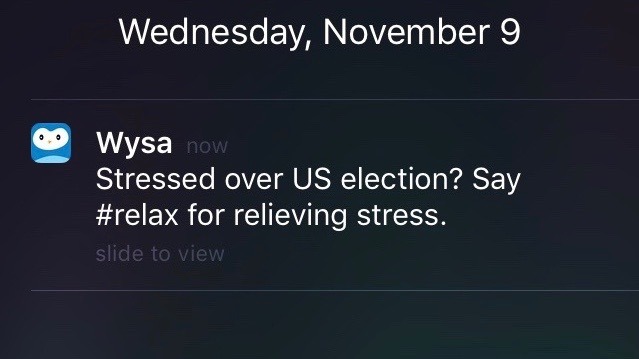
I got this notification while watching the US presidential results.
Jo hopes bots can move toward emotional intelligence. “We want to move away from ‘we will understand everything you say’ to ‘we will understand the emotion behind what you say, and we will respond to that.’
Why is Wysa a penguin? The other candidates were a chicken (a play on “Touchkin”) and a dog with glasses. “[A penguin] can be a ninja. It’s very versatile, very cute,” says Ramakant.
Tech in Asia readers can download Wysa using the code i<3techinasia.
This post Upset about Trump’s win? This penguin chatbot helps combat depression appeared first on Tech in Asia.
from Tech in Asia https://www.techinasia.com/ai-chatbot-wysa-touchkin-penguin
via IFTTT
No comments:
Post a Comment